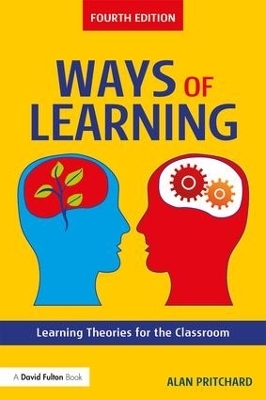
Ways of Learning
Learning Theories for the Classroom
Seiten
2017
|
4th edition
Routledge (Verlag)
978-1-138-20794-3 (ISBN)
Routledge (Verlag)
978-1-138-20794-3 (ISBN)
Ways of Learning has been widely used, and now, fully updated, it seeks to provide further insight into the ways in which learning takes place, which teachers can make use of in their planning and teaching.
While most teachers are skilled in providing opportunities for the progression of children’s learning, it is sometimes without fully understanding the theory behind it. With greater insight into what is currently known about the processes of learning and about individual learners, teachers are better equipped to provide experiences and situations that are more likely to lead to effective acquisition of knowledge, concepts and skills.
Ways of Learning has been widely used and now, fully updated, it seeks to provide further insight into the ways in which learning takes place, which teachers can make use of in their planning and teaching, including:
■ an overview of learning
■ behaviourism and the beginning of theory
■ cognitive and constructivist learning
■ multiple intelligences and learning styles
■ difficulties with learning
■ the influence of neuropsychology
■ other theories, philosophies and names
■ relating theory to practice.
The fourth edition of this book includes developments in areas covered in the preceding editions, as well as expanding on certain topics to bring about a wider perspective; most notably, a new consideration of learning styles and a new chapter detailing important thinkers and writers from the history of education and their continuing influence along with other theories, ideas and thoughts not included in the rest of the book. The book also reflects changes in government policy and is closely related to new developments in practice.
Written for trainee teachers, serving teachers and others interested in learning for various reasons, Ways of Learning serves as a valuable introduction for students setting out on higher degree work who are in need of an introduction to the topic.
While most teachers are skilled in providing opportunities for the progression of children’s learning, it is sometimes without fully understanding the theory behind it. With greater insight into what is currently known about the processes of learning and about individual learners, teachers are better equipped to provide experiences and situations that are more likely to lead to effective acquisition of knowledge, concepts and skills.
Ways of Learning has been widely used and now, fully updated, it seeks to provide further insight into the ways in which learning takes place, which teachers can make use of in their planning and teaching, including:
■ an overview of learning
■ behaviourism and the beginning of theory
■ cognitive and constructivist learning
■ multiple intelligences and learning styles
■ difficulties with learning
■ the influence of neuropsychology
■ other theories, philosophies and names
■ relating theory to practice.
The fourth edition of this book includes developments in areas covered in the preceding editions, as well as expanding on certain topics to bring about a wider perspective; most notably, a new consideration of learning styles and a new chapter detailing important thinkers and writers from the history of education and their continuing influence along with other theories, ideas and thoughts not included in the rest of the book. The book also reflects changes in government policy and is closely related to new developments in practice.
Written for trainee teachers, serving teachers and others interested in learning for various reasons, Ways of Learning serves as a valuable introduction for students setting out on higher degree work who are in need of an introduction to the topic.
Alan Pritchard is Associate Fellow at the Centre for Professional Education, University of Warwick.
Preface
Preface to the fourth edition
Acknowledgements
Chapter 1 Learning
Chapter 2 Behaviourism and the beginnings of theory
Chapter 3 Cognitive, constructivist learning
Chapter 4 Multiple intelligences and Learning styles
Chapter 5 Difficulties with learning
Chapter 6 The impact of neuroeducational research
Chapter 7 Other theories, ideas and people to know about
Chapter 8 Relating theory to practice: what can we learn from research?
Appendix Comparing and contrasting Piaget and Vygotsky – in summary
References
Index
| Erscheinungsdatum | 30.01.2018 |
|---|---|
| Zusatzinfo | 8 Tables, black and white; 1 Line drawings, black and white |
| Verlagsort | London |
| Sprache | englisch |
| Maße | 156 x 234 mm |
| Gewicht | 500 g |
| Themenwelt | Geisteswissenschaften ► Psychologie ► Allgemeine Psychologie |
| Geisteswissenschaften ► Psychologie ► Pädagogische Psychologie | |
| Sozialwissenschaften ► Pädagogik | |
| ISBN-10 | 1-138-20794-2 / 1138207942 |
| ISBN-13 | 978-1-138-20794-3 / 9781138207943 |
| Zustand | Neuware |
| Haben Sie eine Frage zum Produkt? |
Mehr entdecken
aus dem Bereich
aus dem Bereich
wie Affekte innere Entwicklung ermöglichen
Buch | Softcover (2023)
Klett-Cotta (Verlag)
30,00 €
Buch | Softcover (2024)
Hogrefe Verlag
34,95 €


